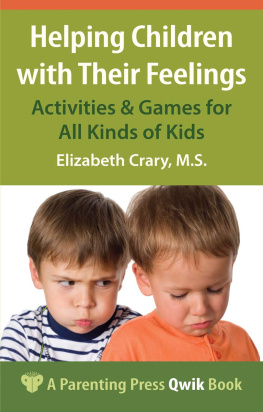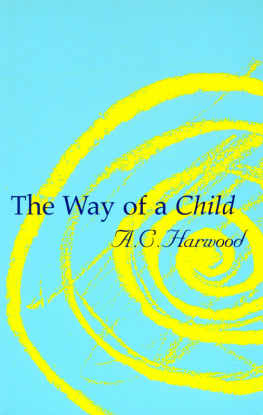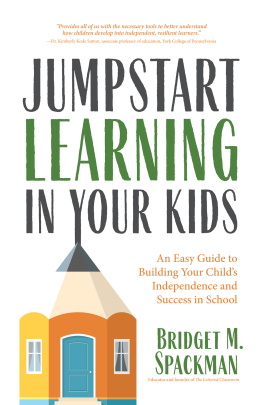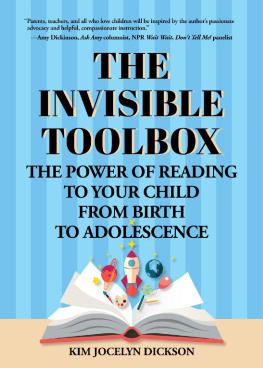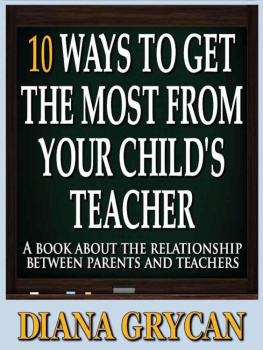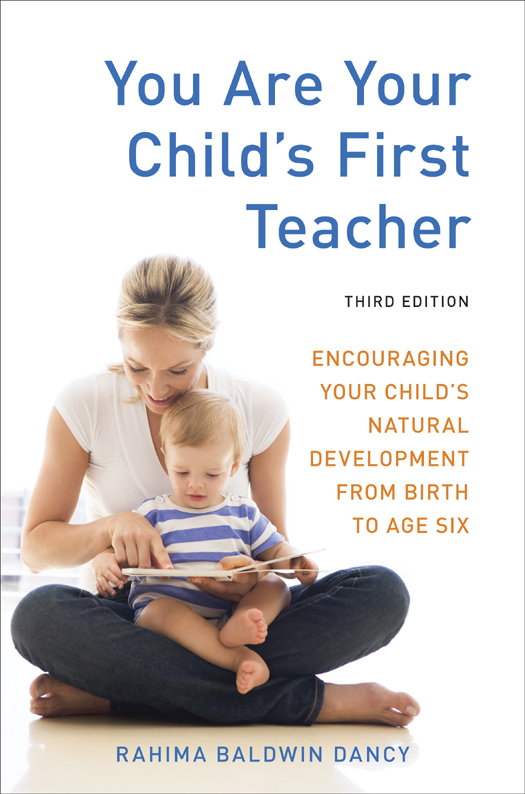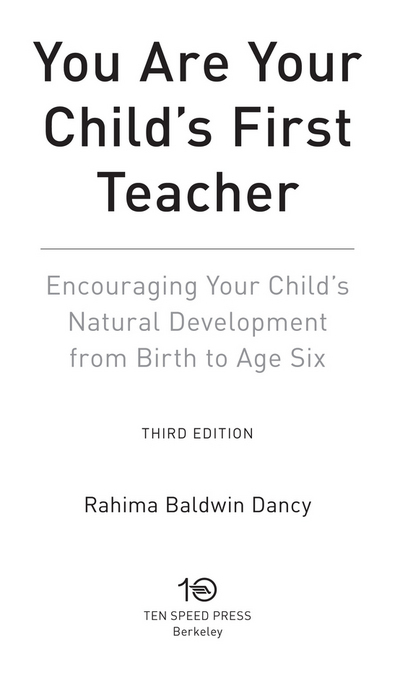Copyright 2000, 2012 by Rahima Baldwin Dancy
Copyright 1989 by Rahima Baldwin
All rights reserved. Published in the United States by Ten Speed Press, an imprint of the Crown Publishing Group, a division of Random House, Inc., New York.
www.crownpublishing.com
www.tenspeed.com
Originally published in the United States in somewhat different form by Celestial Arts, Berkeley, CA, in 1989 and 2000.
Ten Speed Press and the Ten Speed Press colophon are registered trademarks of Random House, Inc.
Library of Congress Cataloging in Publication
Baldwin Dancy, Rahima.
You are your childs first teacher : encouraging your childs natural development from birth to age six / by Rahima Baldwin Dancy. 3rd ed.
p. cm.
Includes bibliographical references.
1. Child rearing. 2. Parenting. 3. Early childhood educationParent participation. I. Title.
HQ769.B31244 2011
649.1dc23
2012007445
eISBN: 978-1-60774-303-3
v3.1_r1
CONTENTS
CHAPTER 1
You Are Your Childs First Teacher
CHAPTER 2
Home Life as the Basis for All Learning
CHAPTER 3
Birth to Three: Growing Down and Waking Up
CHAPTER 4
Helping Your Babys Development
CHAPTER 5
Helping Your Toddlers Development
CHAPTER 6
Rhythm in Home Life
CHAPTER 7
Discipline and Other Parenting Issues
CHAPTER 8
Nourishing Your Childs Imagination and Creative Play
CHAPTER 9
Developing Your Childs Artistic Ability
CHAPTER 10
Encouraging Your Childs Musical Ability
CHAPTER 11
Cognitive Development and Early Childhood Education
CHAPTER 12
Common Parenting Questions: From Television to Immunizations
CHAPTER 13
Help for the Journey
PREFACE TO THE REVISED EDITION
What can parents do with and for their children from birth to age six that will enhance their development without having negative effects at a later age? How can we help our children develop the skills needed for life in a world that is changing at a dizzying rate? These and other questions led me to an in-depth exploration of early childhood and parenting that resulted in the writing of this book.
When I began to study Waldorf education in 1980, I was a young mother overwhelmed by family life and relieved to find that what I was learning about child development and the work of Rudolf Steiner had immediate application in my home life. I was excited to share with others what I was discovering, just as I had with birth and midwifery. I wrote the first edition of this book in 1989 to form a bridge between Steiners insights and all those parents like myself who were looking for a coherent understanding of the developing child that resonated with their values.
After the publication of the first edition, I returned to practicing midwifery by cofounding The Birth Center in Dearborn, Michigan, where we served parents from forty-three different countries over nine years. Following that, I completed a masters degree in gerontology and organizational change while caring for my mother and mother-in-law in my home for six years. Then, in 2008, I returned to a focus on early childhood by opening Rainbow Bridge LifeWays Program in Boulder, Colorado, together with my daughter, Faith Baldwin Collins.
So, as I complete this revision, I am again immersed in the world of one- to five-year-olds and their parentsand find that most parents today are as clueless as I was when my children were young. But how could it be otherwise when the forces working against childhood have only strengthened in the intervening years? These forces include the push toward teaching academics in preschool, high-stakes testing that has eliminated self-directed play in kindergarten, the continuing isolation of mothers and a lack of support for mothering, the obesity epidemic, and young childrens increasing screen time, to name but a few of them. Countering these influences is the increased ease of finding information, support, and resources for creating a home life that meets the real needs of children and parents alike. I am encouraged that since the original publication of this book, there has been a proliferation of Waldorf schools, LifeWays centers and in-home programs, books, online stores, and blogs supporting this understanding of child development and parenting.
For me, one of the unexpected pleasures of having adult children is getting their feedback about what they remember from when they were young, what worked for them, and what didnt. From this vantage point and contemplating how we all got to where we are today, I am filled anew with gratitude for having been led to the insights of Rudolf Steiner. Like many of you, I can say, I wish I had come across them sooner, and I tell new parents, I made every mistake in the bookthats why I wrote the book! It is my wish for you that the insights and practical suggestions described in this book will help you develop your own conscious ethic of parenting and will enrich your personal and home lives as much as they did mine.
I feel strongly that we dont need another authority or set of rules by which to raise children, and I remind parents that Steiner himself never had any children. But if we can enlarge our understanding of child and adult development to encompass the whole human beingbody, mind, emotions, and spiritthen we will be better equipped to make our own decisions based on a combination of cognitive and intuitive knowledge.
As a midwife, I came to see myself as a guardian of normal birth, providing a tremendous amount of support but intervening only as needed. This comes from a fundamental respect for women and their ability to birth normally. Now I see myself as a guardian of normal childhood, speaking up for a new common sense about raising children, one that helps children be children while enabling us to recognize our important role as parents and first teachers. Our task is to understand the childs development and to allow that new knowledge to strengthen our intuition about our own children and grandchildren. Through this we may come to see the value in the simple things we do, as well as the spiritual in even the most mundane.
Wishing you and your growing family all the blessings!
Rahima Baldwin Dancy
Boulder, Colorado, 2012
ACKNOWLEDGMENTS
Both this book and my ongoing work as a parent and early childhood educator take their greatest inspiration from the work of Rudolf Steiner, an Austrian philosopher and educator who founded the first Waldorf school in Stuttgart, Germany, in 1919. Steiners understanding of child development and his reverence for life have enabled me to be with young children in ways that complement the natural unfolding of their capacities. I also owe a debt of gratitude to the late Werner Glas, who served for many years as codirector of the Waldorf Institute, for inspiring me to undertake the task of making the wisdom of Rudolf Steiner more accessible to parents so they can apply it in their home life.
I would also like to acknowledge the work of Burton White, founder of the Center for Parent Education in Newton, Massachusetts. While director of the Harvard Preschool Project and the Brookline Early Education Project, he observed mothers in their homes to see what parenting practices were being used on siblings of wonderful children rather than starting from some theoretical or laboratory base. His observations and conclusions about the first three years of life strongly support many of the principles set down by Rudolf Steiner a half century earlier. His book


